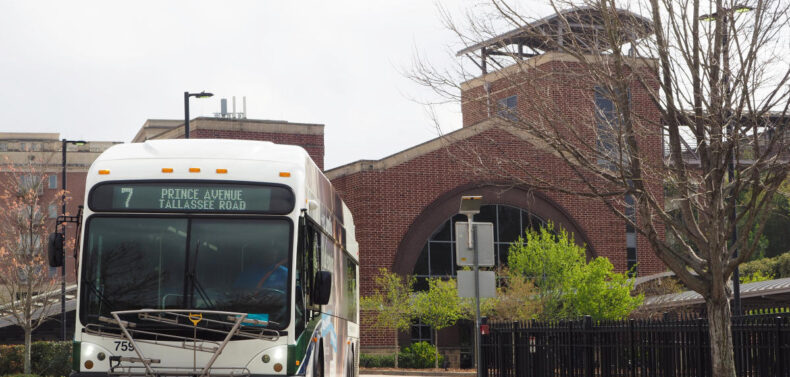Athens-Clarke County officials want to expand transit and provide more frequent service, but to do that they’ll need to find new sources of revenue.
Athens Transit Director Ryan Solchenberger told commissioners at their Mar. 14 work session that he wants to have “an ongoing conversation about how transit can expand and benefit the entire county.” Athens Transit is preparing a five-year development plan that will be released in June.
In April ACC will take over the Health Sciences Campus route from the University of Georgia and is providing twice-an-hour service between Normaltown and downtown, where students, faculty and staff can transfer onto campus buses. (This will also benefit other Athens residents because Campus Transit did not stop at ACC stops along the route.) A transfer station will be included in the Georgia Square Mall redevelopment, and another is planned for the Eastside. By the end of his term, Mayor Kelly Girtz said he wants to see service out to the Caterpillar plant in Bogart and 20-minute headways on major corridors like Broad Street and Prince Avenue. “That’s the kind of thing that attracts new riders,” Girtz said.
Athens Transit has historically been funded by a mix of farebox revenue, general fund contributions and federal grants. But early on during the COVID-19 pandemic, ACC used emergency federal funds to go fare-free and replace the local general fund contribution. However, those federal funds will soon run out and will be replaced by revenue from TSPLOST, the 1% sales tax for transportation voters approved last November. About half of Athens Transit’s operating costs are then reimbursed by the Federal Transit Administration.
Fiscal projections show the agency running a surplus over the next four years, but a deficit starting in 2028. “We can’t sustain this, is really the point,” ACC Manager Blaine Williams said. “But TSPLOST helps.” TSPLOST is only sufficient to maintain current services, Assistant Manager Josh Edwards added. “There is no growth built into these funds,” Edwards said.
Restoring fares would provide a steadier source of revenue because Athens Transit is never sure when or how much it will receive from the FTA through the Georgia DOT from year to year, Solchenberger said. However, it wouldn’t matter much to the overall bottom line because the FTA would deduct farebox revenue from its reimbursement. There is also the question of whether charging fares again would hurt ridership, which has fallen off both locally and nationally since the pandemic started.
On the other hand, expanding service could reverse the slide in ridership, which was the top request when Athens Transit took public input on the transit development plan. “Not surprisingly, a lot of people said more frequent service and more expanded service,” Solchenberger said. “That was a big request. A lot of buses run at 60-minute intervals.”
Another obstacle to expansion is staffing. Athens Transit has 35 full-time bus drivers and 11 vacant positions, Solchenberger said. It is competing for drivers with UGA and the Clarke County School District, both of which pay more, he said. That’s a problem in several departments, and Williams said he will be proposing a pay study in next year’s budget.
For capital projects like transfer stations, ACC also needs matching funds. The federal government will fund 80% of the cost, but the county needs to come up with the remaining 20% first.
Like what you just read? Support Flagpole by making a donation today. Every dollar you give helps fund our ongoing mission to provide Athens with quality, independent journalism.










